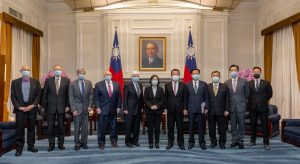Taiwan was showered with attention in the form of high-level official visits during the administration of former United States President Donald Trump, leaving Taiwanese to wonder whether President Joe Biden would continue strengthening a bond between Washington and Taipei that benefits both countries but also angers Beijing.
Biden projected a strong signal this week by sending a delegation to Taipei led by former Senator Chris Dodd to affirm Washington’s commitment to Taiwan’s self-defense in the face of ever-present tensions with China.
Dodd told Taiwan President Tsai Ing-wen the Biden administration would be a “reliable and trusted friend” to Taipei and would work to deepen the security partnership with Taipei.
“I am confident this administration will help you expand your international space and support your investment in self-defense,” Dodd told Tsai in a meeting on Thursday.
Dodd was joined by former U.S. deputy secretaries of state Richard Armitage and James Steinberg and U.S. Department of State Office of Taiwan Coordination Director Dan Biers. All are friends of Biden, who is likely seeking to emphasize the bipartisan nature of U.S. support for Taiwan and soothe historical anxieties about his Democratic Party’s willingness to stand up to the Chinese government.
Last week, the State Department announced new guidelines for Taiwan-U.S. exchanges, which allow “working-level meetings” to take place inside federal buildings or Taiwan’s representative office in New York. These rule changes were initially spurred by a law signed by Trump and were touted by his secretary of state, Mike Pompeo, but they have enjoyed bipartisan support in Washington’s foreign policy establishment.
Dodd mentioned these guidelines to Tsai, saying the change “explicitly and enthusiastically encourages” visits by U.S. government officials to Taiwan and vice versa.
The delegation also met with six members of a United States caucus in Taiwan’s legislature, giving them an opportunity to interact with legislators in the ruling Democratic Progressive Party (DPP) as well as the opposition Kuomintang (KMT) and Taiwan People’s Party (TPP).
According to reports in Taiwanese media, members of the U.S. delegation asked KMT legislators to clarify their interpretation of the so-called 1992 consensus, a supposed understanding between the KMT and Beijing that both sides acknowledge there is “one China” but have different interpretations of what that means.
Tsai and the ruling DPP reject the 1992 consensus, a move which Beijing considers a tacit declaration of Taiwan’s independence.
Chinese leader Xi Jinping said in 2019 he interpreted the 1992 consensus as “one country, two systems,” a form of governance which would put Taiwan under Chinese control and is deeply unpopular across the political spectrum in Taiwan. Tsai immediately denounced Xi’s speech and soon saw a surge in popularity.
The KMT, meanwhile, has struggled to clarify its own understanding of the consensus. KMT legislator Chiang Wan-an, who met with the U.S. delegation, said Friday the consensus does not mean “one country, two systems” but remains a historical basis for cross-strait interaction.
The U.S. delegation took deliberate care not to publicly mention Beijing and did not mention whether the U.S. military would support Taiwan in the event of a Chinese invasion.
The United States continues to maintain strategic ambiguity, a policy of not revealing whether the U.S. military would help Taiwan defend itself against Chinese attacks. Some U.S. officials have mulled ending this policy and publicly committing to defending Taiwan, while others argue it is more beneficial to Taiwan for the U.S. to remain vague on the topic.

































